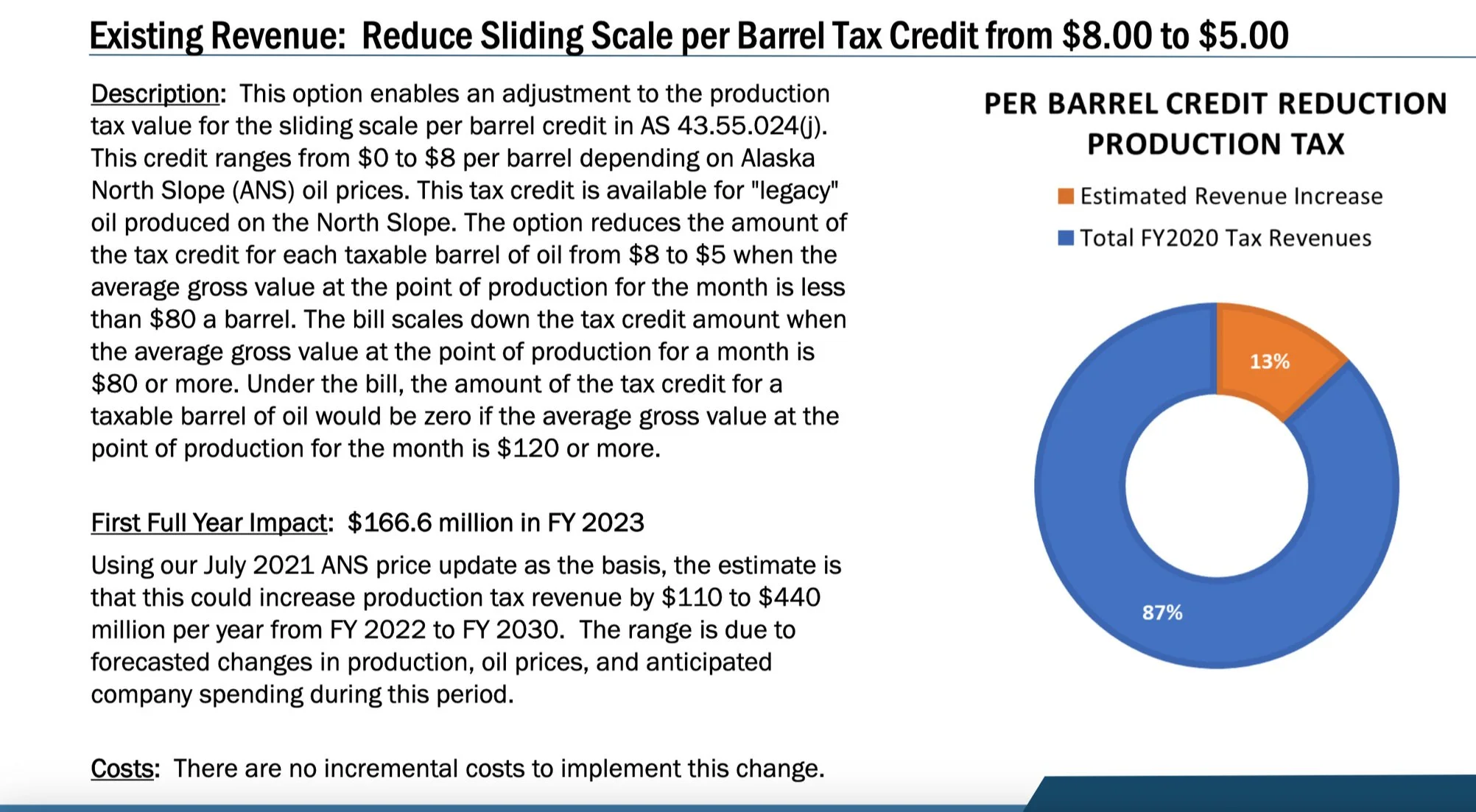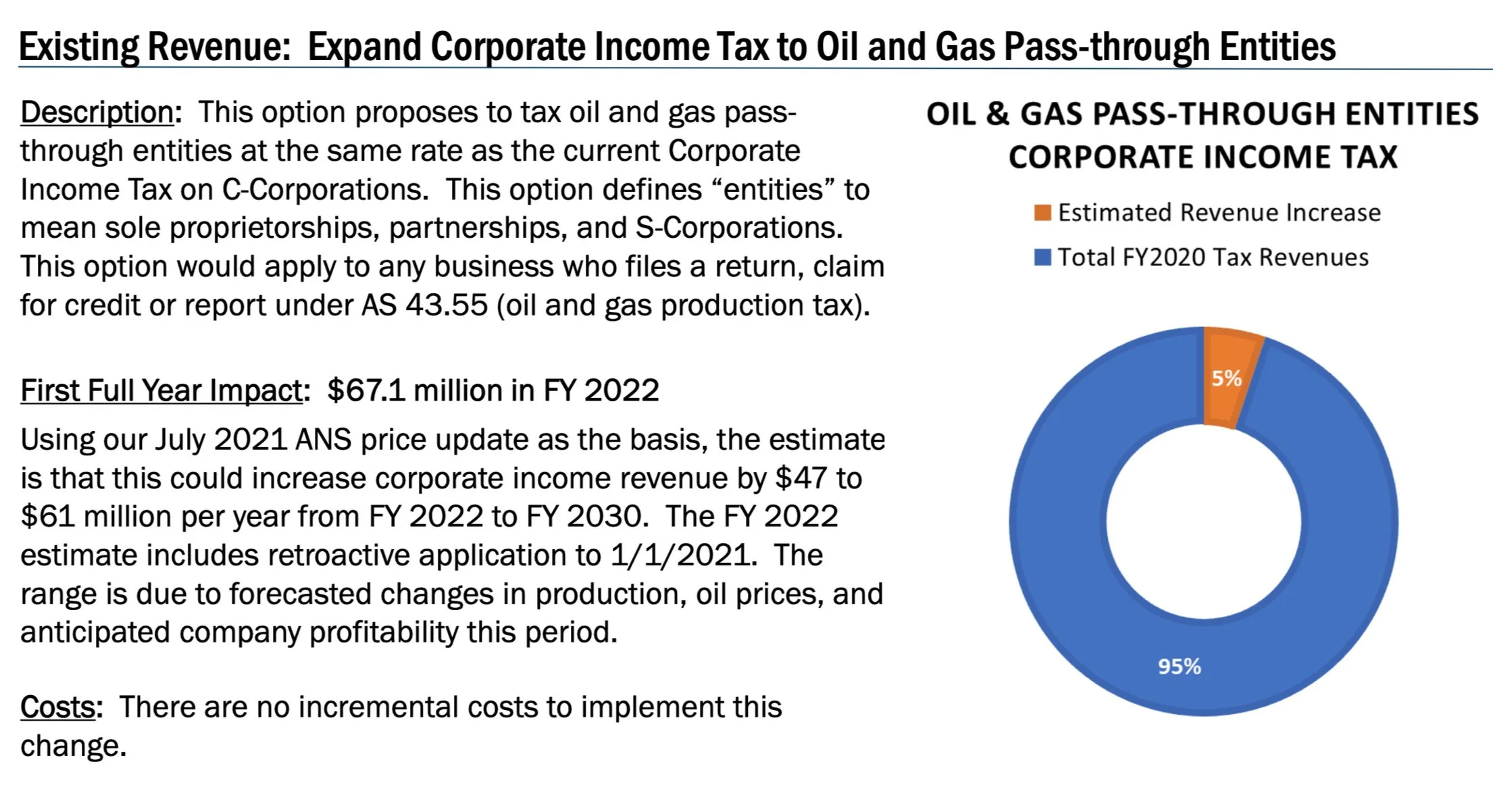Dunleavy pledged in 2021 to back taxes, but only if the Legislature led the way
The progress in the Legislature on revenue measures in recent days is promising.
Gov. Mike Dunleavy, who proposed a $1.5 billion deficit and called it good, continues to act as if it’s not his job to create a reasonable plan that balances state services and state finances.
The Anchorage Daily News has good coverage of three Senate bills that would solve a good part of revenue problem by closing the Hilcorp loophole, SB 92, cutting oil tax credits, SB 112, and taxing “highly digitized” businesses, SB 113.
Matt Buxton of the Alaska Memo has solid coverage as well. There are important details in the reporting by Alaska Public Media.
The oil industry has already cued its professional scolds to quote lines from the Fear and Loathing Anti-Tax Playbook handed down by generations of company employees: Any tax increase, no matter how small, will kill investment and ruin the industry.
These bills will not kill investment, though there will be much wailing and gnashing of teeth, along with fear and loathing.
As the legislative debate evolves, it is important to note that Dunleavy heartily endorsed all three of these relatively minor tax ideas in 2021 and promised to approve them if the Legislature did. He had a key representative testify to the Legislature about his support. He wants Alaskans to forget he did this.
The Anchorage Daily News should add this essential fact to its coverage, as Dunleavy’s spokesman, Jeff Turner, is either unaware of Dunleavy’s 2021 pledge or thinks that no one will remember.
“The governor’s position on taxes has always been consistent,” Turner told the Daily News this week. “He is not favorably disposed to taxes.”
Turner should retract his false claim. Dunleavy has been inconsistent.
Turner claimed to Alaska Public Media this week that Revenue Commissioner Lucinda Mahoney “misspoke” when she testified about support for the 9 measures in 2021. Nonsense. There is no reason to believe Turner is telling the truth about this.
It is more likely that Dunleavy just backed away from his pledge and is still trying to pretend that he never took a position on the proposals described by Mahoney in detail at two meetings. Dunleavy later contradicted himself and said the Legislature had to approve two constitutional amendments before he would support any tax.
In June 2021, Mahoney testified that the administration would present tax and revenue options that Dunleavy would support later that summer.
On Aug. 5, 2021 and again on Aug. 10, 2021, Mahoney testified that Dunleavy would support ending the Hilcorp loophole, reducing oil tax credits and taxing digital businesses if the Legislature approved them first.
In a followup 9-page letter on October 1, 2021 to legislators, there was no mention that anything Mahoney had said about Dunleavy’s support for revenue measures was false.
No one suggested that Mahoney lied to the Legislature or was mistaken about Dunleavy’s position until this week. These were not off-the-cuff remarks by Mahoney. She repeated them at two meetings five days apart.
That Dunleavy later showed little inclination to raise taxes is a separate matter.
Four years ago Dunleavy’s revenue department researched 9 revenue options and found all of them acceptable, but only if the Legislature, not Dunleavy, chose to lead the way, according to the revenue commissioner.
The 9 items were those “the governor would support as long as there was support from the Legislature,” Mahoney told lawmakers on Aug. 5, 2021.
Five days later, she said: “All of these measures are measures that if the Legislature supports these measures, these are revenue measures that the governor would support as well.”
She said that in selecting $5 as the maximum per-barrel oil tax credit, the state had already analyzed what it would mean to the state at different oil price levels.
“Additionally we evaluated the ‘government take’ component and the impact to profitability,” she said.
She said the administration wasn’t talking about a “full production tax change,” just a reduction in the tax credits.
“This was presented as a revenue option that would generate some revenue and would be a minor change. Granted, there will be a lot of discussion about this, we certainly understand that, but this was the only change we considered,” Mahoney said.
Filling the Hilcorp loophole would not be a major change to the tax structure, though Hilcorp will claim that is the case.
About ending the Hilcorp loophole, Mahoney acknowledged the disparity in how the state treated the giant oil companies. ConocoPhillips and ExxonMobil pay an oil company corporate income tax. Hilcorp does not because its owner uses a different business framework never envisioned for the Alaska oil industry giants.
“Some of our oil and gas producing companies are not paying corporate income tax due to the way that their legal structure is set up. We are proposing that those entities begin to pay the corporate income tax and establish parity between the oil industry,” Mahoney said in 2021.
Closing the Hilcorp loophole is long overdue to establish parity, while reducing the per-barrel tax credit is a minor change, as Mahoney said.
Your contributions help support independent analysis and political commentary by Alaska reporter and author Dermot Cole. Thank you for reading and for your support. Either click here to use PayPal or send checks to: Dermot Cole, Box 10673, Fairbanks, AK 99710-0673
This is a slide Gov. Mike Dunleavy’s revenue department created in 2021 when he said he would support a bill to reduce oil tax credits if the Legislature led the way and changed the law.
In 2021, Gov. Mike Dunleavy said he would approve of closing the Hilcorp loophole, but only if the Legislature supported the action first. The administration presented this option to the Legislature.


